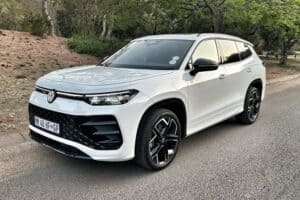There are plenty of diesel offerings in mid-sized SUV segment in South Africa again.

When the new VW Tiguan was rolled out locally in 2021, there was a glaring omission in the line-up.
The German carmaker offered the popular mid-sized SUV in only two petrol derivatives. One being a 110kW/250kW 1.4 TSI and the other a 162kW/350Nm 2.0 TSI. The familiar 2.0-litre diesel offering, which many felt was the sweet spot of the range, was missing.
In light of VW’s “Dieselgate” scandal, there was no certainty that an oil-burning Tiguan would ever be back either.
Fast-forward two years and the picture looks a lot more promising for local buyers. VW has reintroduced diesel power to the Tiguan line-up, albeit only in 4Motion R-Line guise. But let’s not dwell on the trim level of this offering, but rather celebrate its mere existence.
Diesel party
Apart from the absence of the oil-burning VW Tiguan, the whole diesel column in the mid-sized SUV segment was rather thin not that long ago.
The Ford Kuga disappeared altogether and Nissan discontinued the X-Trail in diesel guise. And Kia didn’t offer oil-burning options in rolling out the new Sportage at the end of last year.
This left the Hyundai Tucson, Mazda CX-5 and the BMW X1 as the only competitors left to vie for a seemingly attractive piece of real estate. And the fact that VW has rejoined the party with the Tiguan and Kia has now rolled out three diesel Sportage derivatives, shows diesel is far from dead. In South Africa, at least.
After spending lots of time in the two VW Tiguan petrol derivatives since the range’s introduction in 2021, The Citizen Motoring recently also got to drive the diesel offering.
Straight off the bat, we agreed with the popular opinion that when shopping for a Tiguan, it’s hard to look past the oil-burner.

Smooth power
The 2.0-litre turbodiesel mill produces 130 kW of power between 3 500 and 4 000 rpm and 380 Nm of torque between 1 750 and 3 000 rpm. This is sent to all four wheels via a seven-speed dual-clutch DSG transmission.
What we enjoyed most in the diesel VW Tiguan is that its generous and more instant torque make acceleration faster and smoother off the line than its petrol siblings.
ALSO READ: WATCH: Call the VW Tiguan R a ‘mommy wagon’ at your own peril
The TSI engines do have a lot of turbo lag when pulling off, something which isn’t ideal when trying to survive a busy intersection during load shedding.
Out on the open road, the diesel is a pleasure. Sticking to the national limit hardly stresses the mill, while the generous torque makes overtaking a walk in the park.

VW Tiguan frugal option
And one of the biggest virtues of anything diesel is the fuel consumption. Volkswagen claims the oil-burning Tiguan will sip 6.6 litres of diesel for every 100 km.
Over the course of 488 km with was mostly dense city traffic, we manage to achieve 7.8 L/100 km. This number is quite commendable for a mid-sized SUV.
Priced at R818 600, the VW Tiguan is not cheap. And when you start adding the optional extras – like in the case of our test car – the price can easily run into seven figures.
But the reality is that two of its direct rivals, the Tucson and the CX-5, offered in top-spec trim come in close to R800 000. But price aside, the diesel Tiguan is a good offering. And VW would not have brought it back if it wasn’t.
The Tiguan 2.0 TDI 4Motion comes standard with a five-year/90 000 km service plan and three-year/120 000 km warranty.
Support Local Journalism
Add The Citizen as a Preferred Source on Google and follow us on Google News to see more of our trusted reporting in Google News and Top Stories.






